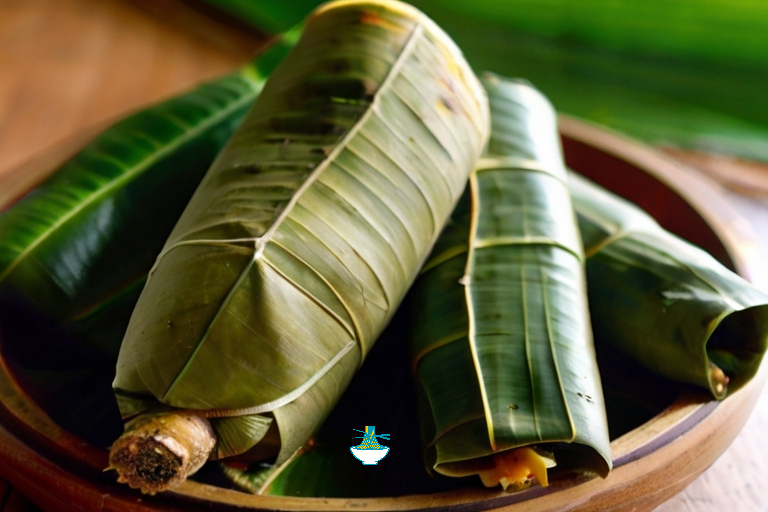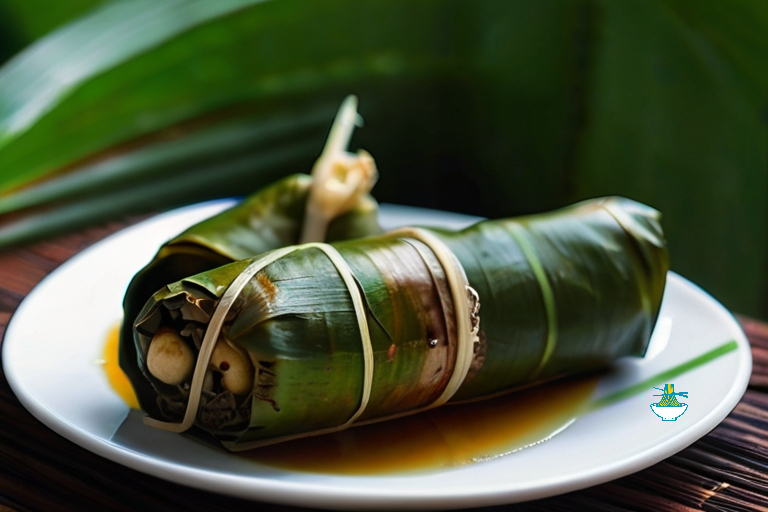Welcome to the heart of Cameroonian cuisine, where tradition meets flavor in a dish that has delighted taste buds for generations: Bobolo. This beloved delicacy embodies the rich culinary heritage of Cameroon, offering a tantalizing combination of textures and tastes that evoke a sense of home and community. Made from fermented cassava, Bobolo is a staple dish enjoyed across the country, cherished for its simplicity yet depth of flavor. Join us on a culinary journey as we explore the art of preparing this authentic Cameroonian delight, sure to leave you craving for more with every bite.
Ingredients:
- 1 kg cassava (fresh or frozen)
- Banana leaves (enough to wrap the bobolo)
- Water
- Salt to taste

Instructions:
Preparation of Cassava:
1- If using fresh cassava, peel and cut it into smaller pieces. If using frozen cassava, thaw it completely.
2- Rinse the cassava pieces thoroughly under cold water to remove any dirt or debris.
Grating Cassava:Using a grater or a food processor, grate the cassava into a fine texture.
Fermentation:
1- Place the grated cassava into a clean container or bowl.
2- Add a pinch of salt to the grated cassava and mix it well. Salt helps in the fermentation process.
3- Cover the container with a clean cloth or plastic wrap and let it ferment at room temperature for 1 to 2 days. The fermentation time may vary depending on the temperature and humidity.
Preparing Banana Leaves:
1- Wash banana leaves thoroughly and pat them dry with a clean kitchen towel.
2- Cut the banana leaves into large squares or rectangles, ensuring they are large enough to wrap the bobolo.
Wrapping Bobolo:
1- Once the cassava is fermented, take a portion of the grated cassava and place it in the center of a banana leaf square.
2- Fold the banana leaf over the cassava to form a parcel, ensuring it is securely wrapped.
3- Repeat this process with the remaining cassava mixture and banana leaves until all the bobolos are wrapped.
Steaming Bobolo:
1- Place the wrapped bobolos in a steamer basket or pot, ensuring they are not overcrowded.
2- Add water to the steamer pot, making sure it doesn't touch the bobolos.
3- Cover the steamer pot with a lid and steam the bobolos over medium heat for about 1 to 1.5 hours, or until they are cooked through and firm to the touch.
Serving:
1- Once cooked, remove the bobolos from the steamer and let them cool slightly.
2- Unwrap the banana leaves and serve the bobolos warm with your favorite sauce or accompaniments.
Enjoy your delicious Cameroon Bobolo!
Note: Bobolo can be served as a side dish or enjoyed on its own as a hearty snack. Its unique flavor and texture are sure to delight your taste buds and transport you to the vibrant culinary landscape of Cameroon.
Nutritional Values:
Nutritional values for the ingredients in the Cameroon Bobolo recipe:
1. Cassava (1 kg, fresh or frozen)
- Calories: ~1,600
- Carbohydrates: ~384g
- Protein: ~4g
- Fat: ~1g
- Sodium: 14mg (natural content)
- Cholesterol: 0mg
- Vitamins: High in vitamin C, folate, and vitamin B6
- Minerals: Potassium, magnesium, and manganese
Nutritional Benefit: Cassava is a high-energy root vegetable, rich in carbohydrates and essential nutrients. It provides a good source of vitamin C, which supports the immune system, and folate, which is important for cell growth and metabolism.
2. Banana Leaves (enough to wrap the bobolo)
- Calories: Negligible (not typically consumed)
- Carbohydrates: Negligible
- Protein: Negligible
- Fat: Negligible
- Sodium: Negligible
- Cholesterol: 0mg
- Vitamins: Contains trace amounts of vitamin A and vitamin C
- Minerals: Contains trace amounts of calcium and iron
Nutritional Benefit: Banana leaves are primarily used for wrapping and cooking food. They add a subtle flavor to the dish and can help retain moisture and nutrients during cooking.
3. Water
- Calories: 0
- Carbohydrates: 0g
- Protein: 0g
- Fat: 0g
- Sodium: 0mg
- Cholesterol: 0mg
- Vitamins: None
- Minerals: None
Nutritional Benefit: Water is essential for hydration and cooking, ensuring that the cassava is properly prepared and safe to eat.
4. Salt (to taste)
- Calories: 0
- Carbohydrates: 0g
- Protein: 0g
- Fat: 0g
- Sodium: ~2,300mg per teaspoon
- Cholesterol: 0mg
- Vitamins: None
- Minerals: Sodium
Nutritional Benefit: Salt enhances the flavor of the dish and provides essential sodium, which is important for fluid balance and nerve function. However, it should be used in moderation to avoid excessive sodium intake.
This breakdown provides a comprehensive view of the nutritional content and benefits of each ingredient used in making bobolo.
It's important to note that these nutritional values are approximate and may vary based on factors such as the specific type and brand of ingredients used, as well as any variations in portion sizes or cooking methods.


Comments